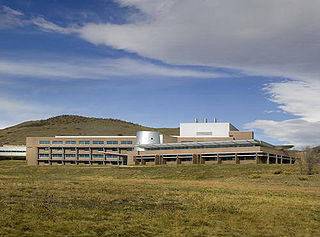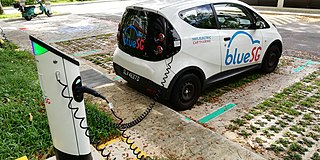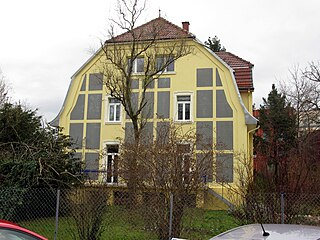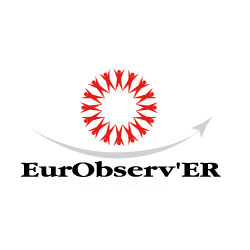Related Research Articles
Energy economics is a broad scientific subject area which includes topics related to supply and use of energy in societies. Considering the cost of energy services and associated value gives economic meaning to the efficiency at which energy can be produced. Energy services can be defined as functions that generate and provide energy to the “desired end services or states”. The efficiency of energy services is dependent on the engineered technology used to produce and supply energy. The goal is to minimise energy input required to produce the energy service, such as lighting (lumens), heating (temperature) and fuel. The main sectors considered in energy economics are transportation and building, although it is relevant to a broad scale of human activities, including households and businesses at a microeconomic level and resource management and environmental impacts at a macroeconomic level.

Denis Allen Hayes is an environmental advocate and an advocate for solar power. He rose to prominence in 1970 as the coordinator for the first Earth Day.

The National Renewable Energy Laboratory (NREL) in the US specializes in the research and development of renewable energy, energy efficiency, energy systems integration, and sustainable transportation. NREL is a federally funded research and development center sponsored by the Department of Energy and operated by the Alliance for Sustainable Energy, a joint venture between MRIGlobal and Battelle. Located in Golden, Colorado, NREL is home to the National Center for Photovoltaics, the National Bioenergy Center, and the National Wind Technology Center.

A low-energy house is characterized by an energy-efficient design and technical features which enable it to provide high living standards and comfort with low energy consumption and carbon emissions. Traditional heating and active cooling systems are absent, or their use is secondary. Low-energy buildings may be viewed as examples of sustainable architecture. Low-energy houses often have active and passive solar building design and components, which reduce the house's energy consumption and minimally impact the resident's lifestyle. Throughout the world, companies and non-profit organizations provide guidelines and issue certifications to guarantee the energy performance of buildings and their processes and materials. Certifications include passive house, BBC—Bâtiment Basse Consommation—Effinergie (France), zero-carbon house (UK), and Minergie (Switzerland).

A Zero-Energy Building (ZEB), also known as a Net Zero-Energy (NZE) building, is a building with net zero energy consumption, meaning the total amount of energy used by the building on an annual basis is equal to the amount of renewable energy created on the site or in other definitions by renewable energy sources offsite, using technology such as heat pumps, high efficiency windows and insulation, and solar panels.

Clean technology, also called cleantech or climatetech, is any process, product, or service that reduces negative environmental impacts through significant energy efficiency improvements, the sustainable use of resources, or environmental protection activities. Clean technology includes a broad range of technology related to recycling, renewable energy, information technology, green transportation, electric motors, green chemistry, lighting, grey water, and more. Environmental finance is a method by which new clean technology projects can obtain financing through the generation of carbon credits. A project that is developed with concern for climate change mitigation is also known as a carbon project.

The International Solar Energy Society (ISES) is a global organization for promoting the development and utilization of renewable energy. ISES is a UN-accredited NGO headquartered in Freiburg im Breisgau, Germany. Dr. David S. Renné is the current president.
The Office of Energy Efficiency and Renewable Energy (EERE) is an office within the United States Department of Energy. Formed from other energy agencies after the 1973 energy crisis, EERE is led by the Assistant Secretary of Energy Efficiency and Renewable Energy, who is appointed by the president of the United States and confirmed by the U.S. Senate. Alejandro Moreno currently leads the office as the Acting Assistant Secretary.

The developing nations of Africa are popular locations for the application of renewable energy technology. Currently, many nations already have small-scale solar, wind, and geothermal devices in operation providing energy to urban and rural populations. These types of energy production are especially useful in remote locations because of the excessive cost of transporting electricity from large-scale power plants. The applications of renewable energy technology has the potential to alleviate many of the problems that face Africans every day, especially if done in a sustainable manner that prioritizes human rights.
Green jobs are, according to the United Nations Environment Program, "work in agricultural, manufacturing, research and development (R&D), administrative, and service activities that contribute(s) substantially to preserving or restoring environmental quality. Specifically, but not exclusively, this includes jobs that help to protect ecosystems and biodiversity; reduce energy, materials, and water consumption through high efficiency strategies; de-carbonize the economy; and minimize or altogether avoid generation of all forms of waste and pollution." The environmental sector has the dual benefit of mitigating environmental challenges as well as helping economic growth.
Richard Steven "Dick" Levine is an American environmental architect, solar energy and sustainability pioneer, and professor at the University of Kentucky. He is one of the early solar energy innovators in the U.S., a holder of U.S. patents on structural systems and solar energy applications, and the architect of a number of award winning solar buildings including his widely published Raven Run Solar House (1974). Levine is co-director of the Center for Sustainable Cities at the University of Kentucky. His contributions to sustainable urban planning are in both the theory and practice of the sustainable city-region. He has over 150 publications on solar energy and sustainability research, conducted in Italy, Austria, China and the Middle East.
Environmentally sustainable design is the philosophy of designing physical objects, the built environment, and services to comply with the principles of ecological sustainability and also aimed at improving the health and comfort of occupants in a building. Sustainable design seeks to reduce negative impacts on the environment, the health and well-being of building occupants, thereby improving building performance. The basic objectives of sustainability are to reduce the consumption of non-renewable resources, minimize waste, and create healthy, productive environments.
A sustainability organization is (1) an organized group of people that aims to advance sustainability and/or (2) those actions of organizing something sustainably. Unlike many business organizations, sustainability organizations are not limited to implementing sustainability strategies which provide them with economic and cultural benefits attained through environmental responsibility. For sustainability organizations, sustainability can also be an end in itself without further justifications.
The University of Kansas Sustainable Automotive Energy Infrastructure Initiative, or more commonly referred to as the KU Ecohawks is an ongoing project that works to promote sustainability in the automotive sector. Founded during the beginning of the Automotive industry crisis of 2008–2010 in the U.S., the group recycles old vehicles to run on community wastes and renewables, especially on the University of Kansas campus and not rely on conventional fossil fuel sources that pollute the local and global environment.

The Ontario Sustainable Energy Association (OSEA) is a non-profit organization supporting the growth of renewable energy and Community Power projects in the Canadian Province of Ontario. OSEA advocated an advanced renewable energy Feed-in Tariff program for Ontario, resulting in the creation of the Renewable Energy Standard Offer Program, a precursor to the Green Energy Act and, in 2007, the most progressive energy policy in North America in a decade. OSEA has approximately 130 community and industry members as well as individual members. The affairs of the association are managed by a board of directors elected by the membership.

The World Resources Forum (WRF) is a non-profit organisation for sharing knowledge about the economic, political, social and environmental implications of global resource use. WRF promotes resource productivity among researchers, policymakers, business, NGOs and the public. In addition to organizing international and regional conferences, the WRF Secretariat coordinates multistakeholder dialogue projects, amongst others the Sustainable Recycling Initiative (SRI) as well as the H2020 projects Towards a World Forum on Raw Materials (FORAM), and CEWASTE. The WRF contributes to other EC-projects and projects with the German development organisation GiZ, UNEP and UNIDO.
James Eugene Rogers Jr. was an American businessman and author. He was president and CEO of Duke Energy, the largest electrical utility in the U.S., from April, 2006 until July 1, 2013. He stayed on as Chairman of the Board until retiring the following December. His book, Lighting the World, which explores the issues involved in bringing electricity to over 1.2 billion people on earth who lack it, was published August 25, 2015, by St. Martin's Press. The book asserts that access to electricity should be recognized as a basic human right.
Kenneth L. Haggard is an American architect, educator, and solar pioneer who has designed more than 300 buildings and seen more than 200 of his designs built. He is a licensed architect in California and Florida. He and his partner Polly Cooper were awarded the American Solar Energy Society Passive Solar Pioneer Award in 1996. They have been leaders in both passive solar architecture and the rediscovery of straw bale building.

EurObserv'ER is a consortium dedicated to the monitoring of the development of the various sectors of renewable energies in the European Union.

The Council on Energy, Environment and Water, commonly known as CEEW, is a Not-For profit Think Tank and policy institution based in New Delhi, India. CEEW was formed to provide independent research-based insights to policymakers for building a sustainable India. The Council also has an office in Lucknow, Uttar Pradesh. It has multiple research projects running across 22 Indian states and other parts of the world.
References
- ↑ Karl Boer, editor (2005): The Fifty-Year History of the International Solar Energy Society and its National Sections, Vol. 1, pp 7-8
- ↑ "Solar Today Magazine | American Solar Energy Society". solartoday.org.
- ↑ "ASES National Solar Tour | Experience Solar in Your Community". nationalsolartour.org.